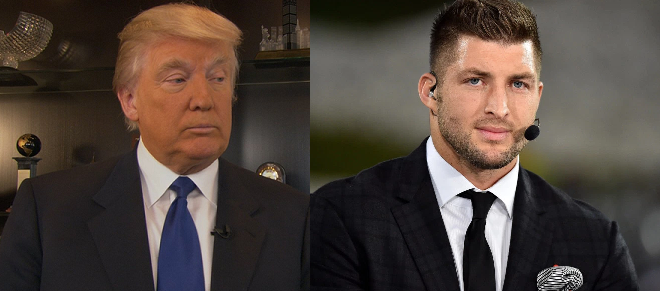While I generally like to stay away from publicly commenting on politics, this story is pretty funny, if only because Donald Trump bid $12,000 on a signed Tim Tebow helmet while he was a member of the Denver Broncos. Talk about peak earning. But he didn’t bid on the item with his own money, but rather the money of a charity that he was the president of. Which included other people’s money. [Washington Post]
Four years ago, at a charity fundraiser in Palm Beach, Donald Trump got into a bidding war at the evening’s live auction. The items up for sale: A Denver Broncos helmet, autographed by then-star quarterback Tim Tebow, and a Tebow jersey.
Trump won, eventually, with a bid of $12,000. Afterward, he posed with the helmet. His purchase made gossip-column news: a flourish of generosity, by a mogul with money to burn. “The Donald giveth, and The Donald payeth,” wrote the Palm Beach Daily News. “Blessed be the name of The Donald.”
But Trump didn’t actually pay with his own money.
Instead, the Susan G. Komen organization — the breast-cancer nonprofit that hosted the party — got a $12,000 payment from another nonprofit, the Donald J. Trump Foundation.
Trump himself sent no money (In fact, a Komen spokesperson said, Trump has never given a personal gift of cash to the Komen organization). He paid the bill with money from a charity he founded in 1987, but which is largely stocked with other people’s money. Trump is thefoundation’s president. But, at the time of the auction, Trump had given none of his own money to the foundation for three years running.
Investigative reporters have found a lot of this in Trump’s past, where he’s said he’s given money to charity, but that money is nowhere to be accounted for. And if Trump didn’t donate the helmet to charity, he may have violated IRS rules as detailed by the Post.
Afterward, three experts on tax law questioned whether Trump had violated IRS rules against “self-dealing” — which are designed to keep nonprofit officials from using their charities to help themselves.
Those rules ban the “furnishing of goods” by private foundations — like Trump’s — to their own officers. If the rule is broken, the person who breaks it must notify the IRS, and may have to pay a tax penalty. There could also be penalties for signing a tax return that failed to mention the violation. In 2012, the tax return for Trump’s foundation checked the boxes for “no,” it did not break the self-dealing rule.
You can read more about it here.

